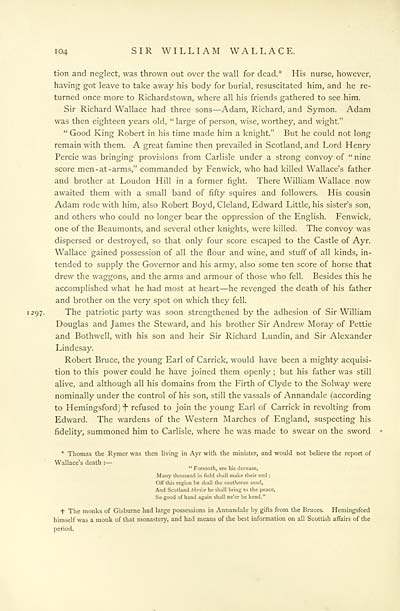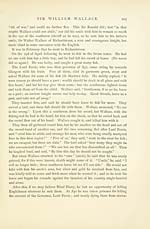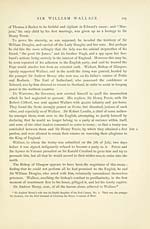Family records of the Bruces and the Cumyns
(116) Page 104
Download files
Complete book:
Individual page:
Thumbnail gallery: Grid view | List view

104 SIR WILLIAM WALLACE.
tion and neglect, was thrown out over the wall for dead.* His nurse, however,
having got leave to take away his body for burial, resuscitated him, and he re-
turned once more to Richardstown, where all his friends gathered to see him.
Sir Richard Wallace had three sons — Adam, Richard, and Symon. Adam
was then eighteen years old, " large of person, wise, worthey, and wight."
" Good King Robert in his time made him a knight." But he could not long
remain with them. A great famine then prevailed in Scotland, and Lord Henry
Percie was bringing provisions from Carlisle under a strong convoy of " nine
score men-at-arms," commanded by Fenwick, who had killed Wallace's father
and brother at Loudon Hill in a former fight. There William Wallace now
awaited them with a small band of fifty squires and followers. His cousin
Adam rode with him, also Robert Boyd, Cleland, Edward Little, his sister's son,
and others who could no longer bear the oppression of the English. Fenwick,
one of the Beaumonts, and several other knights, were killed. The convoy was
dispersed or destroyed, so that only four score escaped to the Castle of Ayr.
Wallace gained possession of all the flour and wine, and stuff of all kinds, in-
tended to supply the Governor and his army, also some ten score of horse that
drew the waggons, and the arms and armour of those who fell. Besides this he
accomplished what he had most at heart — he revenged the death of his father
and brother on the very spot on which they fell.
1297. The patriotic party was soon strengthened by the adhesion of Sir William
Douglas and James the Steward, and his brother Sir Andrew Moray of Pettie
and Bothvvell, with his son and heir Sir Richard Lundin, and Sir Alexander
Lindesay.
Robert Bruce, the young Earl of Carrick, would have been a mighty acquisi-
tion to this power could he have joined them openly ; but his father was still
alive, and although all his domains from the Firth of Clyde to the Solway were
nominally under the control of his son, still the vassals of Annandale (according
to Hemingsford) -f refused to join the young Earl of Carrick in revolting from
Edward. The wardens of the Western Marches of England, suspecting his
fidelity, summoned him to Carlisle, where he was made to swear on the sword
* Thomas the Rymer was then living in Ayr with the minister, and would not believe the report of
Wallace's death : —
" Forsooth, ere his decease,
Many thousand in field shall make their end ;
Off this region he shall the southeron send,
And Scotland thrice he shall bring to the peace,
So good of hand again shall ne'er be kend."
t The monks of Gisburne had large possessions in Annandale by gifts from the Braces. Hemingsford
himself was a monk of that monastery, and had means of the best information on all Scottish affairs of the
period.
tion and neglect, was thrown out over the wall for dead.* His nurse, however,
having got leave to take away his body for burial, resuscitated him, and he re-
turned once more to Richardstown, where all his friends gathered to see him.
Sir Richard Wallace had three sons — Adam, Richard, and Symon. Adam
was then eighteen years old, " large of person, wise, worthey, and wight."
" Good King Robert in his time made him a knight." But he could not long
remain with them. A great famine then prevailed in Scotland, and Lord Henry
Percie was bringing provisions from Carlisle under a strong convoy of " nine
score men-at-arms," commanded by Fenwick, who had killed Wallace's father
and brother at Loudon Hill in a former fight. There William Wallace now
awaited them with a small band of fifty squires and followers. His cousin
Adam rode with him, also Robert Boyd, Cleland, Edward Little, his sister's son,
and others who could no longer bear the oppression of the English. Fenwick,
one of the Beaumonts, and several other knights, were killed. The convoy was
dispersed or destroyed, so that only four score escaped to the Castle of Ayr.
Wallace gained possession of all the flour and wine, and stuff of all kinds, in-
tended to supply the Governor and his army, also some ten score of horse that
drew the waggons, and the arms and armour of those who fell. Besides this he
accomplished what he had most at heart — he revenged the death of his father
and brother on the very spot on which they fell.
1297. The patriotic party was soon strengthened by the adhesion of Sir William
Douglas and James the Steward, and his brother Sir Andrew Moray of Pettie
and Bothvvell, with his son and heir Sir Richard Lundin, and Sir Alexander
Lindesay.
Robert Bruce, the young Earl of Carrick, would have been a mighty acquisi-
tion to this power could he have joined them openly ; but his father was still
alive, and although all his domains from the Firth of Clyde to the Solway were
nominally under the control of his son, still the vassals of Annandale (according
to Hemingsford) -f refused to join the young Earl of Carrick in revolting from
Edward. The wardens of the Western Marches of England, suspecting his
fidelity, summoned him to Carlisle, where he was made to swear on the sword
* Thomas the Rymer was then living in Ayr with the minister, and would not believe the report of
Wallace's death : —
" Forsooth, ere his decease,
Many thousand in field shall make their end ;
Off this region he shall the southeron send,
And Scotland thrice he shall bring to the peace,
So good of hand again shall ne'er be kend."
t The monks of Gisburne had large possessions in Annandale by gifts from the Braces. Hemingsford
himself was a monk of that monastery, and had means of the best information on all Scottish affairs of the
period.
Set display mode to:
![]() Universal Viewer |
Universal Viewer | ![]() Mirador |
Large image | Transcription
Mirador |
Large image | Transcription
Images and transcriptions on this page, including medium image downloads, may be used under the Creative Commons Attribution 4.0 International Licence unless otherwise stated. ![]()
| Histories of Scottish families > Family records of the Bruces and the Cumyns > (116) Page 104 |
|---|
| Permanent URL | https://digital.nls.uk/95072378 |
|---|
| Description | A selection of almost 400 printed items relating to the history of Scottish families, mostly dating from the 19th and early 20th centuries. Includes memoirs, genealogies and clan histories, with a few produced by emigrant families. The earliest family history goes back to AD 916. |
|---|

